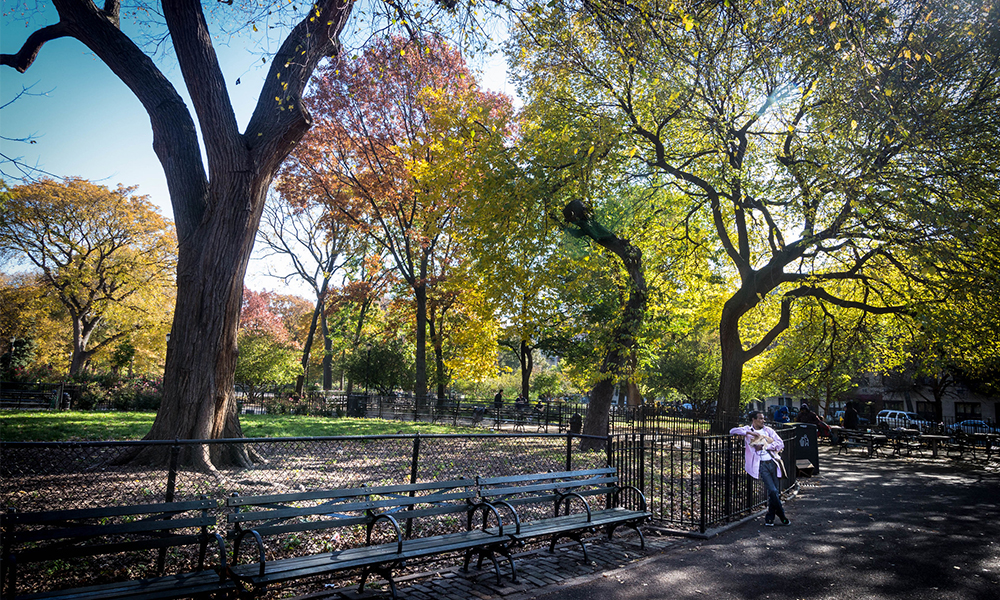Edgar Oliver calls himself the “King of the Slow.” This is what a friend dubbed him one stoned afternoon in his boarding house on 10th Street, in the East Village of a long-ago Manhattan, as Oliver writes in his brilliant “New York Trilogy.”
A certain, scrappy group of us making theater in New York in the 1980s — all friends of Edgar’s —performed at the Pyramid Club, the Kitchen, La Mama, P.S. 122. We drank at a bar called Downtown Beirut. This is speaking in code, of course — out of sync with the Manhattan streets I walked to Edgar’s latest show at the Axis Theatre, itself a placeholder for downtown theater. In the 1940s it was the Cafe Society, the first unsegregated nightclub in the United States, open to black patrons as well as performers. In the 1970s it was taken over by Charles Ludlam’s Ridiculous Theatrical Company, featuring drag queens. This past October, at the Axis, Edgar performed his play, “Victor,” about a homeless man whom he befriended for over 30 years. The play was directed by Randy Sharp. I try to see all of Edgar’s shows, not only because I once shared a world with him (and several stages), but because Edgar has the ability to change the quality of time. Edgar is always and only Edgar, whether he is playing a Shakespearian king or a Lithuanian warlock. This is in large part because of The Voice.
Edgar is best known for his gothic, sonorous voice, beloved to audiences of the storytelling project, “The Moth.” As Edgar has explained, The Voice is not something he affects for performances. It is the voice he grew into as a lonely, closeted boy, in a world so isolated and internally rich that it seems impossible for him to exist outside of the theater. To listen to Edgar tell stories is to move into a slower, more vivid way of experiencing the world. I visited Edgar once at the house on East 10th Street where Edgar lived for 34 years. I was in my early 20s, and Edgar looked almost exactly as he does now. I remember that his house looked like an abandoned building, with the numbers painted by hand over the door in thin gothic lettering which reminded me of Edgar himself.
Edgar’s friend Victor Greco died alone in a van under the Manhattan Bridge last February. His new play is a tender love story. Victor was unable to keep his job behind the counter of the Second Avenue Deli, perhaps because, as Edgar says, “He used to claim to be a werewolf — and I sort of believed him.” After Victor was evicted from his rooming house, he continued to slip notes and poems through the mail slot in Edgar’s door, written on pages from The Village Voice, scraps of notebook paper, anything he could find to write or draw. One poem had the lines, “Who is that creature at your door?” The two Os in “door” were drawn as a pair of eyes.
Victor would sometimes sleep on Edgar’s doorstep. Edgar noticed over time that Victor had carved out a sort of niche in the stone at the bottom of the lintel, just large enough for Victor to slip his hand inside as he slept; a guardian at his fragile gate. Edgar would sometimes visit Victor on his bench in Tompkins Square Park, where Victor narrated classic movies to him. “King Kong” was Victor’s favorite. When Edgar describes this, with his graceful fingers and liquid facial expressions, in the Axis Theatre’s black box space, elegantly lit by David Zeffren, with Chad Yarborough’s set abstractly evoking the night streets, Victor is King Kong, triumphantly climbing the Empire State Building from a bench in Tompkins Square park, chosen because the bathrooms in Tompkins Square stay open late.
In the lobby outside the theater, Victor’s letters, notes, and two cans of “Popeye” spinach which Victor gave Edgar are set in glass cases — artifacts of a friendship. When Victor spent time in a nursing home because of a foot infection — a malady endemic to homelessness — Edgar visited him, and they watched “From Here to Eternity.” As Edgar reports with gentle irony, the coroner said that Victor died of “natural causes.” As I left the theater, I noticed for the first time that the triangle park at Christopher Street, where my friends and I smoked furtive cigarettes as teenagers, was now designated as “Stonewall National Monument,” with a plaque from the National Park Service. I had the odd feeling of watching aspects of my own life become archived. Then I thought of the curated display of handwritten notes and drawings from Victor to Edgar, which are the opposite of our contemporary addiction to document and share every experience before we have taken the time to understand it. Edgar’s performances, permeated with cackling absurdity, longing and sincerity, are an antidote to our current times, spent navigating an increasingly rapid stream of information and rage.
Banner Photo: Bruce Monroe.


